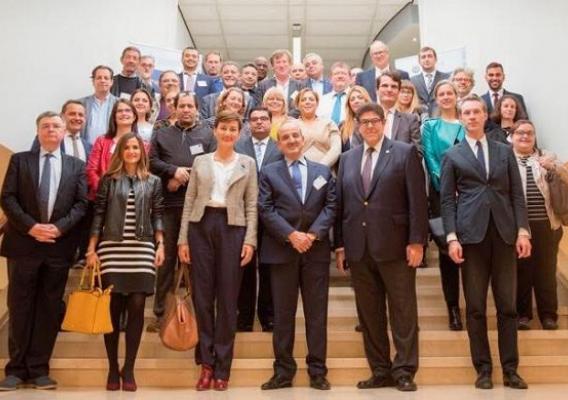BUSINESSMED at the third UfM Social Dialogue Forum
BUSINESSMED at the third UfM Social Dialogue Forum
Brussels
10/10/2017 to 11/10/2017
On 10-11 October 2017, the Euro-Mediterranean Social Partners held the third Union for the Mediterranean Social Dialogue Forum.
About 40 representatives of trade unions and employers’ organisations from both shores of the Mediterranean gathered in Brussels to discuss priorities and the state of implementation of the “Declaration on Social Dialogue” (presented at the UfM Ministerial Conference on Employment and Labour in September 2016).
The social partners adopted joint conclusions at the end of their meeting:
- A number of social partners (employer and trade union representatives) of the Union for the Mediterranean (UfM) met bilaterally on 10 and 11 October, as part of the 3rd Social Dialogue Forum of the Union for the Mediterranean.
- The purpose of the meeting was in particular to review the implementation of the “Declaration on Social Dialogue” adopted in September 2016 by BusinessMed, BusinessEurope, the Arab Trade Union Confederation (ATUC) and the European Trade Union Confederation (ETUC) during the 3rd Employment and Labour Ministerial Conference, which was held in Jordan (Dead Sea, 26-27 September 2016).
- More specifically, the social partners of both sides of the Mediterranean – convinced of the added value of an independent and effective bilateral and trilateral social dialogue for democracy, competitiveness and social development – first examined the recent developments of the social dialogue in Europe and in the countries of the South, on the basis of an introductory report by the ILO. Their assessment shows that significant structural challenges remain in the North, and that for certain countries in the South experiencing attacks on the freedom of association, there is an even greater problem.
- The social partners then discussed a range of good practices in the four areas covered by their Declaration: informal work, youth employment, skills development, and migration. They also examined the way in which the social partners are involved in the definition and the implementation of two other key subjects: COP21 follow-up and decent work in global supply chains.
- In concluding their work, the Euro-Mediterranean participants in particular:
- called on Ministers to fulfil their commitment in their “Declaration of the Employment and Labour Ministerial Conference”, “to boost the capacity of social partners’ organisations and of social dialogue institutions, as well as the culture of social dialogue, by developing sound dialogue practices both in companies and in sectors”. The social partners therefore call on national authorities to deliver on this commitment;
- stressed, while recognising the diversity of national circumstances, the need to consider how to translate both the Ministerial Declaration and the Declaration on Social Dialogue into practical measures, so as to respond to the realities and to created added value for the social partners not only in the “Euro-Mediterranean” region, but also at the national level in the member countries of the UfM;
- welcomed the presentation made by the ATUC and BusinessMed on the progress of the “Pilot project for the Promotion of Social Dialogue in the Southern Mediterranean Neighbourhood” (known as “Solid”), which primarily covers Jordan, Morocco and Tunisia. The social partners support the principle of a “Solid II” project intended to strengthen the capacities of social dialogue actors and to expand the project to other countries in the South, in particular with a view to improved awareness raising of good national practices based on the information provided by the national social partners. For this reason they are calling on the Commission to explore the possibility of allocating the funds required for this, while taking into account the lessons learnt from the current Solid project.
- The participants also agreed to further examine – in accordance with the internal procedures specific to each organisation – several areas for follow-up mentioned during their work (such as: looking more deeply at the issue of migration, considering “the future of work”, establishing a “point of contact”, preparing for the fourth UfM Social Dialogue Forum, …). A more specific list will be drawn up following the internal consultations.
- Finally, the social partners thank the European Commission for having organised the 3rd Social Dialogue Forum of the UfM. Having been informed of the difficulties that visa issuance procedures can cause for certain participants from the South travelling to the countries of the EU, and to facilitate greater attendance on their part at the meetings of the UfM, the employer and trade union representatives suggest adapting the application of the principle of rotation between meetings organised in European countries and southern Mediterranean countries on a case-by-case basis, by trying to prioritise, as far as possible, the holding of major fora/certain meetings in the countries of the South, and by taking into account the meaningful participation of the social partners from the North. Should meaningful attendance by Northern social partners not be expected, favouring meetings in the countries of the southern Mediterranean could be prioritised to allow for increased participation by the representatives of the South.









